John Dickinson: 'Penman of the Revolution'
John Dickinson, known as the "Penman of the Revolution," was an instrumental part of efforts by colonial Americans to secure their freedom and form a representative form of government. He strongly cautioned against using violence as a political solution but, nonetheless, fought for his country during the Revolutionary War. He was born on his family's tobacco plantation, near the village of Trappe, in Talbot County, Maryland, on Nov. 8, 1732. His father was a well-to-do farmer who moved the family to Kent County, near Dover, Delaware, in 1740 hired private tutors to educate young John. Among his educators was William Killen, who went on to serve as Delaware's first Chief Justice and Chancellor. 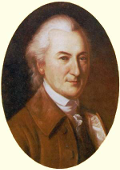
Dickinson followed in his lawyer father's footsteps, training in Philadelphia and London. He took up a law practice in Philadelphia in 1757 and quickly earned a reputation as one of the colonies' most able legal minds. He soon became interested in politics and was elected to the Delaware legislature in 1760. He owned land in Pennsylvania as well as in Delaware and so was able to serve in the Pennsylvania legislature as well. In 1770, he married Mary Norris, who also came from a wealthy family. Among her personal property was a 1,500-book library, one of the largest in America. They had five children, only two of whom survived to adult. The Dickinsons lived at Fair Hill, near Germantown, on a property belonging to Mary. They built a mansion nearby but, because of the war, never lived in it. Dickinson was a strong believer in the idea of a social contract, an Enlightenment principle championed by English philosopher John Locke and others that said that a people in a society agreed to a social contract with their government and that both the people and their government had certain expectations of each other. An eloquent writer and speaker, he spoke out often against the call for violence against Great Britain. 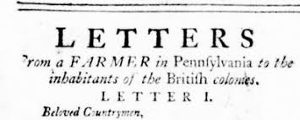
He opposed the Stamp Act as excessive and attended the Stamp Act Congress but urged his fellow Americans to trust that the economic pressure that they were applying by refusing to do things that required the dreaded British stamp would be enough to force a change; he was proved correct when Parliament repealed the Stamp Act. Two years later, in response to the Townshend Acts, he collected his arguments in a series of essays, the Letters from a Farmer in Pennsylvania to the Inhabitants of the British Colonies. The letters appeared in the Pennsylvania Chronicle and gained him recognition both at home and abroad. In particular, it helped convince many in America to oppose British rule–peacefully, of course. He even penned a music number, "The Liberty Song." He wrote the words and set them to the music of "Heart of Oak," the British Royal Navy anthem. One of the verses is this:
Dickinson urged a calm, measured, economic approach to a subsequent set of parliamentary laws, the Intolerable Acts, and he was unhappy with the radical approach of Samuel Adams and the Sons of Liberty. Dickinson served in both the First Continental Congress and the Second Continental Congress and, during the latter, drafted a letter urging Canada to join the 13 Colonies in opposing those laws. It was at that Congress that he contributed to the Declaration of Rights and Grievances. He was the author of the "Olive Branch Petition," a last-ditch attempt to convince the British King and Parliament to see reason; it was unsuccessful. Dickinson continued to pursue that course of action, preferring it to consenting to join the call for independence, which he fundamentally opposed. The lone holdout, he refused to sign the Declaration of Independence but made himself absent for the final vote on independence so the vote could be unanimous. He never did sign it. 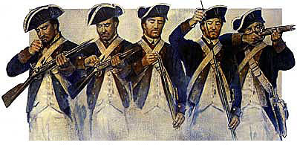
Once the Declaration had been signed and announced and the colonies were technically at war with Great Britain, however, Dickinson volunteered to serve in the militia, to fight for the colonies, expressing his support in the "Declaration of Causes of Taking Up Arms." He was chairman of the Pennsylvania Committee of Safety and Defense and organized the Associators, the first group of troops assembled in Philadelphia. That group later saw deployment when a large British force landed in New York harbor, and Dickinson personally commanded a garrison at Elizabeth, N.J. He gave more than his time and efforts to the cause: British soldiers burned Fair Hill, his wife's Philadelphia estate, and his Delaware lands were also damaged. (One consequence of this was that he freed his slaves.) He left the Associators and went home, to Delaware. He returned to active duty at the call of Delaware's Captain Stephen Lewis, who mobilized the Delaware volunteers to defend against an expected attack by British General William Howe on Philadelphia, then serving as the new nation's capital. General Caesar Rodney had overall command of the Delaware militia, and Dickinson, a private, headed up a company of men that guarded the approach to the Brandywine River. Dickinson gained appointment as a brigadier general in October 1777. He resigned his commission the following year and left the militia once and for all. 
Delaware appointed him to serve in the Continental Congress. He signed the Articles of Confederation, being a firm believer in the balance of power between state governments and the federal government. He changed his mind after serving as governor of both Delaware and Pennsylvania and seeing firsthand the need for a strong executive that represented all citizens. He was chairman of the Annapolis Convention in 1786 and the Constitutional Convention in 1787. He threw himself into the negotiations that highlighted the convention and was one of the architects of the Great Compromise that created the two houses of Congress and stipulated their makeup. He was ill at the time of the signing of the Constitution, and so his name appears on the document but not in his own hand. (His friend and fellow delegate George Read signed his name.) 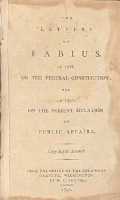
Echoing the efforts of Alexander Hamilton, James Madison, and John Jay in writing the Federalist Papers, Dickinson wrote a series of open letters to the populace at large, urging them to accept the Constitution. He signed the letters "Fabius." In December 1787, Delaware became the first state to ratify the Constitution. Dickinson was chairman of Delaware's constitutional convention and later resurrected "Fabius" as the author of a defense of revolutionary France, in 1797. In 1801, he published two collections of his writings. As the revolution in France descended into mob rule, he changed his mind on supporting the new leaders and, in one of his last writings, An Address on the Past, Present, and Eventual Relations of the United States to France, urged his country to consider France, its onetime ally, a threat. Dickinson died at Wilmington, Del., in 1808. he was 75. Members of Congress wore black armbands in his honor. His memory lives on in the names of a college (Dickinson College, which began as John and Mary's College in 1784), a school of law (Dickinson School of Law, at Pennsylvania State University), and a high school (John Dickinson High School in Milltown, Del.). Famous Quotes of John Dickinson Among Dickinson's more famous quotes are these:
|
|
Social Studies for Kids
copyright 2002–2026
David White



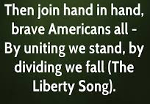 Then join hand in hand, brave Americans all,
Then join hand in hand, brave Americans all,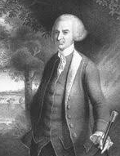 "Let our government be like that of the solar system. Let the general government be like the sun and the states the planets, repelled yet attracted, and the whole moving regularly and harmoniously in several orbits."
"Let our government be like that of the solar system. Let the general government be like the sun and the states the planets, repelled yet attracted, and the whole moving regularly and harmoniously in several orbits."
